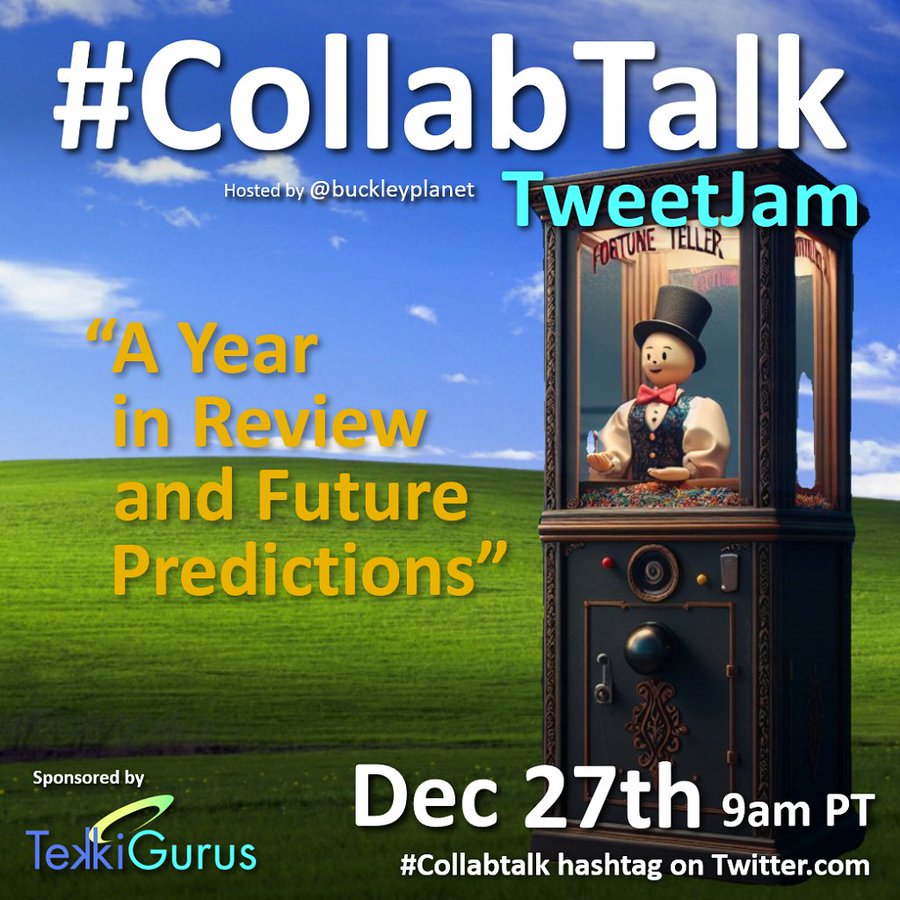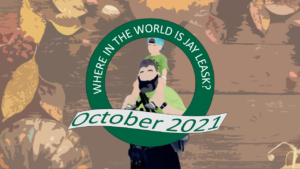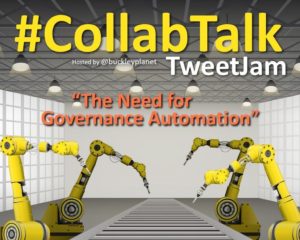I have been eerily silent on the blog throughout most of 2023 – it was not ominous, just busy. And as the new year often brings resolutions of impossible promises, I am here with new blog content! I make no resolution or promise, just a summary of the first #TweetJam that I’ve participated in since … a long time ago. Thanks for the consistent opportunity to participate in amazing discussions Christian!
What is a TweetJam
As a reminder, if you’re new to the #TweetJam concept, Tweets are short. Currently, Twitter restricts comments to 280 characters and, where URLs are present, using URL shortening to help get the most out of this limited space. If you jump into the conversation, you may see “(1/2)” in a post, which means the poster needed more than 280 characters, so check out that person’s Twitter stream to see the rest of the message.
#CollabTalk does some great stuff helping organize the hundreds of posts that come through in an hour by breaking up the topic into seven questions and requesting everyone use #collabtalk and A1 where the number matches the question. Good stuff if you’re trying to keep up.
Below are my answers to today’s seven questions, and a few of my favorites from the community (way too many to share them all!). I welcome your feedback either in the comments or on Twitter! But if you do join us on Twitter make sure you follow the rules!! Use #CollabTalk A$ where $ is the question number (e.g., “#CollabTalk A3”).
Q1: What are your top 3 impactful Microsoft features or developments from 2023, and why do they stand out for 2024?
Props to John White and Kurt Kragh Sørensen for my including my two favorite other responses: Microsoft Fabric and Microsoft Viva (the latter of which I ALMOST talked about, but I’m torn on this topic, for reasons to be discussed at another time).
Q2: How have Microsoft 365’s new features, like Copilot and ongoing updates, impacted your daily workflows?
Paul Swider receives honorable mention for the most honest answer I can think of: 0%. Copilot is awesome, but if you’re not in one of a few specific groups of very special people, you don’t have access to it yet.
Also, a common complaint is the price point. Today, Copilot comes with a hefty entry point. Microsoft is counting on those early adopters to see a strong return on their investment due to the valuable output and increased productivity, but I suspect we may see this price decrease, not only as more people begin to use it, but as Microsoft is able to remove barriers to entry (e.g., the minimum license purchase of 300 seats is a blocker for many small businesses).
Q3: Given the updates to Microsoft Teams, how do you see collaboration and remote work evolving in Microsoft’s ecosystem next year?
Amy Dolzine and Galen Keene really hit the nail on the head: isn’t it time we just started calling it “work”?
Q4: With Microsoft 365 Copilot’s launch, how has your use of Microsoft productivity tools changed? Predictions for AI in the workplace?
One of the things that the Microsoft marketing machine has done VERY well is the branding around Copilot. Specifically, by calling it Copilot, we are saying YOU are still in charge: it’s your work, it’s your assignment, it’s your brain; Copilot is by your side, making it easier. Or, as Martina said, Copilot support[s] me!
And as Shari points out: not only are WE still learning how to use it, but it is still learning from us!
I also REALLY like this reminder from Eli Robillard: much like developers need to use Agile correctly, we need a methodology for using AI in the workplace. A methodology can assure our organizations we are using it responsibly, and assure our people that it is working in our favor.
Q5: How will Microsoft’s AI advancements, especially in OpenAI, Bing, and Windows, shape the ecosystem in 2024? Thoughts on AI’s future impact?
John White takes a more literal approach to what we see as AI, that it is instead still glorified search. Does it have value? Yes. Is it intelligent? Maybe not yet. Thankfully. I’d have to say I don’t think we’re ready for true artificial intelligence.
Q6: In light of 2023’s challenges, including business slowdowns and cloud outages, what key lessons should Microsoft carry into 2024?
What are Microsoft’s key lessons learned? It’s always fun. There are responses from pragmatic to pessimist, from dogmatic to literal. As a member of the Microsoft Partner ecosystem for the past 8 years, I think Martina’s observation about the value to come out of Microsoft’s OpenAI partnership shows just how seriously Microsoft takes it’s partners. Not all of them will have the impact of OpenAI and Nvidia, but I love seeing Microsoft build off it’s partners.
Another thing I hear a lot is that AI does NOT take away from the human side of things. Today, at least, AI does not replace humans – we provide context, feeling, validation, and so much more. Sharon and Shari take this point home:
Q7: What’s your one strategic piece of advice for Microsoft’s leadership for 2024, considering the dynamic 2023 landscape?
Like Q6, there’s a lot of varied opinions, ranging from overly exuberant to burnt-out. Some common themes: licensing, pricing, adoption, feature maturity … too many to list them all here (check this search link to scan them yourself). I’ll focus on this – we’ve seen a LOT of features over the past year, perhaps too many, perhaps not enough, but commonly we hear that it’s hard to keep up with the rate of change. However, some question if those features are coming out mature or perhaps too soon in order to generate buzz. The following two examples of this opinion are particularly interesting as they span three years between them: Susan Hanley in 2020 and Adnan Amin in 2023. This is a tough call for Microsoft, as there is no easy answer.
It’s a wrap
As always, massive thanks to Christian Buckely, without whom the 10 year-old TweetJams may not even exist. He works tirelessly to ensure topics are picked, questions are prepared, and panelists remember to join.
Also, I would be remiss not to call out my beautiful wife who, in the past year, has switched from full time teaching to technology consulting with a focus on AI efficacy and education (both corporate and academia) who joined her first TweetJam this month!
So, tell me. What do you think about this year-end TweetJam? Did any specific opinions resonate with you? Did anything give you an Aha! moment? Let me know in the comments and get ready join us later this quarter for the now-quarterly #CollabTalk TweetJam!



